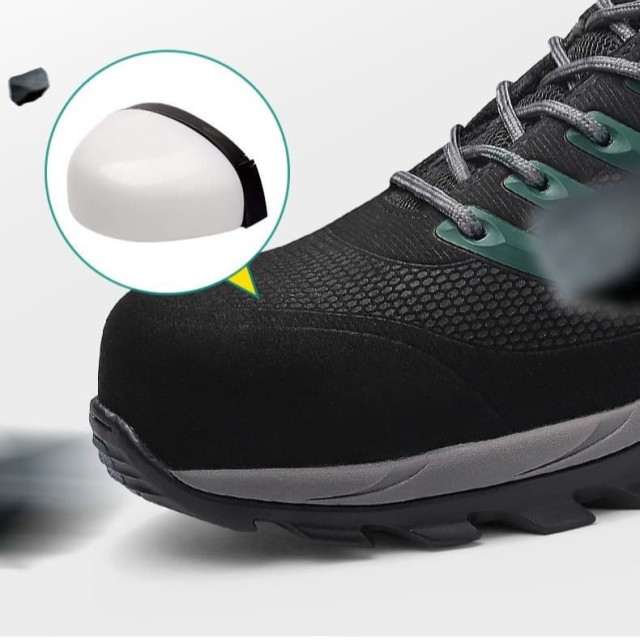For workers who need reliable foot protection without the bulk and discomfort of traditional steel-toed boots, composite safety footwear offers a certified, lightweight alternative. These boots meet rigorous ASTM/ISO standards while addressing common workplace challenges—from electrical hazards to extreme temperatures—making them ideal for construction crews, warehouse staff, and industrial technicians.
How Composite Materials Meet Safety Standards
Composite toe caps, typically made from materials like carbon fiber, Kevlar, or reinforced plastics, provide protection comparable to steel but with critical advantages.
Key Safety Validations:
- Impact & Compression Resistance: ASTM F2413-certified composite toes withstand 75 ft-lbs of impact force (e.g., a 50 lb object dropped from 1.5 feet) and 2,500 lbs of compression—matching steel toe requirements.
- Electrical Insulation: Non-metallic materials prevent conductivity, reducing risks in environments with live wires or static-sensitive equipment.
- Temperature Neutrality: Unlike steel, composites don’t transfer extreme heat or cold, making them safer for welding or freezer storage work.
Did you know? Composite materials maintain consistent protection in temperatures ranging from -40°F to 500°F, unlike metal toes that can become brittle in cold or scalding in heat.
Weight and Durability: Composite vs. Steel
The most cited benefit of composite toe boots is their reduced weight—often 30% lighter than steel equivalents—without sacrificing durability.
Practical Comparisons:
| Feature | Composite Toe | Steel Toe |
|---|---|---|
| Weight | ~2 lbs per boot | ~3 lbs per boot |
| Longevity | Resists cracks/rust | Prone to corrosion |
| Flexibility | More foot mobility | Rigid structure |
Workers report less fatigue during 10+ hour shifts, especially in roles requiring ladder climbing or rapid movement (e.g., warehouse order pickers).
Beyond the Toe: Additional Safety Features to Consider
Modern composite boots integrate innovations that address whole-foot protection:
- Puncture-Resistant Midsoles: Prevent nails or sharp debris from penetrating the footbed.
- Slip-Resistant Outsoles: Essential for oil-prone floors in auto shops or kitchens.
- Wide Toe Boxes: Accommodate orthotics or swollen feet after long shifts.
Pro Tip: Look for boots with metatarsal guards if your work involves heavy rolling objects (e.g., construction pipes or manufacturing drums).
Choosing the Right Composite Footwear
Industry-Specific Recommendations
- Construction/Welding: Prioritize heat-resistant outsoles and electrical hazard (EH) ratings.
- Warehousing/Logistics: Opt for lightweight designs with shock-absorbing heels.
- Landscaping: Waterproof membranes and anti-slip treads are critical.
Top Brands with ASTM/ISO-Certified Options
While specific models vary, leading manufacturers like 3515 Footwear produce rigorously tested composite boots for bulk buyers, combining:
- Customizable fits for wide or narrow feet
- Breathable linings to reduce sweat buildup
- Quick-drying materials for outdoor work
Upgrade Your Safety Gear Today
For distributors and brand owners seeking high-performance composite toe boots at scale, 3515 Footwear delivers certified protection tailored to industrial demands. [Contact our team] to discuss bulk solutions that keep workers safe and comfortable.
Final Thought: The right safety boot shouldn’t feel like a compromise—modern composites prove you can have lightweight agility and uncompromising protection in one design.
Products You Might Be Looking For:
View customizable composite toe work boots
Explore wedge sole safety footwear
Shop ASTM-certified steel toe work shoes
Browse moc-toe work boots with composite protection
See slip-resistant wedge sole work shoes
Related Products
- Customizable Anti-Smash Safety Boots for Wholesale & Private Label Manufacturing
- Wholesale Leather Safety Boots with Customizable Protective Toe
- Wholesale Durable Safety Boots Manufacturer Customizable Steel Toe Work Boots
- Wholesale Customizable Safety Boots Durable & Protective Footwear Manufacturing
- Wholesale Slip-On Safety Boots Manufacturer - Custom Puncture-Proof & Steel Toe
Related Articles
- Steel-Toe vs. Composite-Toe Boots: How to Choose the Right Safety Footwear for Your Job
- Matching Men’s Work Shoe Safety Technologies to Workplace Hazards
- Steel-Toe Boot Safety: Separating Fact from Fiction
- How Steel Toe Shoes Meet Safety Standards and Prevent Workplace Injuries
- How to Choose Steel Toe Shoes That Balance Safety and Comfort




















